Yang Shi
Research on World Models Is Not Merely Injecting World Knowledge into Specific Tasks
Feb 02, 2026Abstract:World models have emerged as a critical frontier in AI research, aiming to enhance large models by infusing them with physical dynamics and world knowledge. The core objective is to enable agents to understand, predict, and interact with complex environments. However, current research landscape remains fragmented, with approaches predominantly focused on injecting world knowledge into isolated tasks, such as visual prediction, 3D estimation, or symbol grounding, rather than establishing a unified definition or framework. While these task-specific integrations yield performance gains, they often lack the systematic coherence required for holistic world understanding. In this paper, we analyze the limitations of such fragmented approaches and propose a unified design specification for world models. We suggest that a robust world model should not be a loose collection of capabilities but a normative framework that integrally incorporates interaction, perception, symbolic reasoning, and spatial representation. This work aims to provide a structured perspective to guide future research toward more general, robust, and principled models of the world.
DiaDem: Advancing Dialogue Descriptions in Audiovisual Video Captioning for Multimodal Large Language Models
Jan 27, 2026Abstract:Accurate dialogue description in audiovisual video captioning is crucial for downstream understanding and generation tasks. However, existing models generally struggle to produce faithful dialogue descriptions within audiovisual captions. To mitigate this limitation, we propose DiaDem, a powerful audiovisual video captioning model capable of generating captions with more precise dialogue descriptions while maintaining strong overall performance. We first synthesize a high-quality dataset for SFT, then employ a difficulty-partitioned two-stage GRPO strategy to further enhance dialogue descriptions. To enable systematic evaluation of dialogue description capabilities, we introduce DiaDemBench, a comprehensive benchmark designed to evaluate models across diverse dialogue scenarios, emphasizing both speaker attribution accuracy and utterance transcription fidelity in audiovisual captions. Extensive experiments on DiaDemBench reveal even commercial models still exhibit substantial room for improvement in dialogue-aware captioning. Notably, DiaDem not only outperforms the Gemini series in dialogue description accuracy but also achieves competitive performance on general audiovisual captioning benchmarks, demonstrating its overall effectiveness.
Riemannian Liquid Spatio-Temporal Graph Network
Jan 20, 2026Abstract:Liquid Time-Constant networks (LTCs), a type of continuous-time graph neural network, excel at modeling irregularly-sampled dynamics but are fundamentally confined to Euclidean space. This limitation introduces significant geometric distortion when representing real-world graphs with inherent non-Euclidean structures (e.g., hierarchies and cycles), degrading representation quality. To overcome this limitation, we introduce the Riemannian Liquid Spatio-Temporal Graph Network (RLSTG), a framework that unifies continuous-time liquid dynamics with the geometric inductive biases of Riemannian manifolds. RLSTG models graph evolution through an Ordinary Differential Equation (ODE) formulated directly on a curved manifold, enabling it to faithfully capture the intrinsic geometry of both structurally static and dynamic spatio-temporal graphs. Moreover, we provide rigorous theoretical guarantees for RLSTG, extending stability theorems of LTCs to the Riemannian domain and quantifying its expressive power via state trajectory analysis. Extensive experiments on real-world benchmarks demonstrate that, by combining advanced temporal dynamics with a Riemannian spatial representation, RLSTG achieves superior performance on graphs with complex structures. Project Page: https://rlstg.github.io
CoF-T2I: Video Models as Pure Visual Reasoners for Text-to-Image Generation
Jan 15, 2026Abstract:Recent video generation models have revealed the emergence of Chain-of-Frame (CoF) reasoning, enabling frame-by-frame visual inference. With this capability, video models have been successfully applied to various visual tasks (e.g., maze solving, visual puzzles). However, their potential to enhance text-to-image (T2I) generation remains largely unexplored due to the absence of a clearly defined visual reasoning starting point and interpretable intermediate states in the T2I generation process. To bridge this gap, we propose CoF-T2I, a model that integrates CoF reasoning into T2I generation via progressive visual refinement, where intermediate frames act as explicit reasoning steps and the final frame is taken as output. To establish such an explicit generation process, we curate CoF-Evol-Instruct, a dataset of CoF trajectories that model the generation process from semantics to aesthetics. To further improve quality and avoid motion artifacts, we enable independent encoding operation for each frame. Experiments show that CoF-T2I significantly outperforms the base video model and achieves competitive performance on challenging benchmarks, reaching 0.86 on GenEval and 7.468 on Imagine-Bench. These results indicate the substantial promise of video models for advancing high-quality text-to-image generation.
MMErroR: A Benchmark for Erroneous Reasoning in Vision-Language Models
Jan 06, 2026Abstract:Recent advances in Vision-Language Models (VLMs) have improved performance in multi-modal learning, raising the question of whether these models truly understand the content they process. Crucially, can VLMs detect when a reasoning process is wrong and identify its error type? To answer this, we present MMErroR, a multi-modal benchmark of 2,013 samples, each embedding a single coherent reasoning error. These samples span 24 subdomains across six top-level domains, ensuring broad coverage and taxonomic richness. Unlike existing benchmarks that focus on answer correctness, MMErroR targets a process-level, error-centric evaluation that requires models to detect incorrect reasoning and classify the error type within both visual and linguistic contexts. We evaluate 20 advanced VLMs, even the best model (Gemini-3.0-Pro) classifies the error in only 66.47\% of cases, underscoring the challenge of identifying erroneous reasoning. Furthermore, the ability to accurately identify errors offers valuable insights into the capabilities of multi-modal reasoning models. Project Page: https://mmerror-benchmark.github.io
Detecting Unobserved Confounders: A Kernelized Regression Approach
Jan 01, 2026Abstract:Detecting unobserved confounders is crucial for reliable causal inference in observational studies. Existing methods require either linearity assumptions or multiple heterogeneous environments, limiting applicability to nonlinear single-environment settings. To bridge this gap, we propose Kernel Regression Confounder Detection (KRCD), a novel method for detecting unobserved confounding in nonlinear observational data under single-environment conditions. KRCD leverages reproducing kernel Hilbert spaces to model complex dependencies. By comparing standard and higherorder kernel regressions, we derive a test statistic whose significant deviation from zero indicates unobserved confounding. Theoretically, we prove two key results: First, in infinite samples, regression coefficients coincide if and only if no unobserved confounders exist. Second, finite-sample differences converge to zero-mean Gaussian distributions with tractable variance. Extensive experiments on synthetic benchmarks and the Twins dataset demonstrate that KRCD not only outperforms existing baselines but also achieves superior computational efficiency.
GRAN-TED: Generating Robust, Aligned, and Nuanced Text Embedding for Diffusion Models
Dec 17, 2025Abstract:The text encoder is a critical component of text-to-image and text-to-video diffusion models, fundamentally determining the semantic fidelity of the generated content. However, its development has been hindered by two major challenges: the lack of an efficient evaluation framework that reliably predicts downstream generation performance, and the difficulty of effectively adapting pretrained language models for visual synthesis. To address these issues, we introduce GRAN-TED, a paradigm to Generate Robust, Aligned, and Nuanced Text Embeddings for Diffusion models. Our contribution is twofold. First, we propose TED-6K, a novel text-only benchmark that enables efficient and robust assessment of an encoder's representational quality without requiring costly end-to-end model training. We demonstrate that performance on TED-6K, standardized via a lightweight, unified adapter, strongly correlates with an encoder's effectiveness in downstream generation tasks. Second, guided by this validated framework, we develop a superior text encoder using a novel two-stage training paradigm. This process involves an initial fine-tuning stage on a Multimodal Large Language Model for better visual representation, followed by a layer-wise weighting method to extract more nuanced and potent text features. Our experiments show that the resulting GRAN-TED encoder not only achieves state-of-the-art performance on TED-6K but also leads to demonstrable performance gains in text-to-image and text-to-video generation. Our code is available at the following link: https://anonymous.4open.science/r/GRAN-TED-4FCC/.
Scone: Bridging Composition and Distinction in Subject-Driven Image Generation via Unified Understanding-Generation Modeling
Dec 14, 2025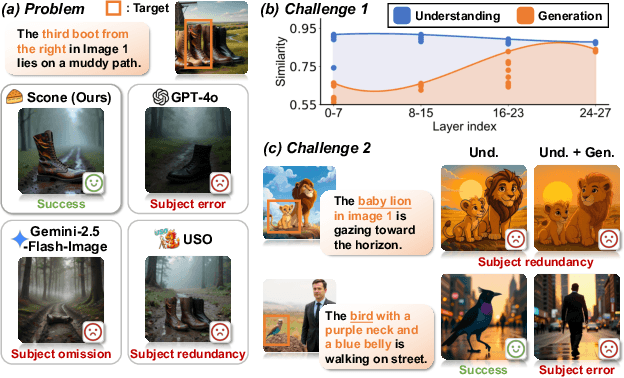

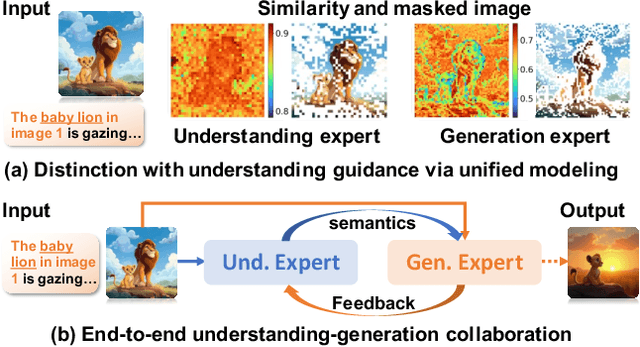
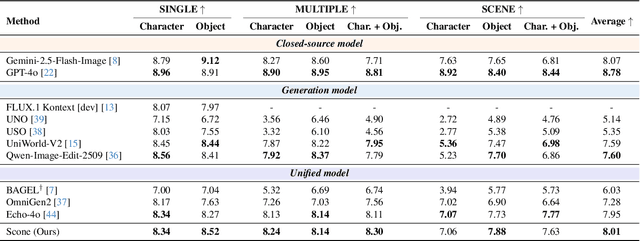
Abstract:Subject-driven image generation has advanced from single- to multi-subject composition, while neglecting distinction, the ability to identify and generate the correct subject when inputs contain multiple candidates. This limitation restricts effectiveness in complex, realistic visual settings. We propose Scone, a unified understanding-generation method that integrates composition and distinction. Scone enables the understanding expert to act as a semantic bridge, conveying semantic information and guiding the generation expert to preserve subject identity while minimizing interference. A two-stage training scheme first learns composition, then enhances distinction through semantic alignment and attention-based masking. We also introduce SconeEval, a benchmark for evaluating both composition and distinction across diverse scenarios. Experiments demonstrate that Scone outperforms existing open-source models in composition and distinction tasks on two benchmarks. Our model, benchmark, and training data are available at: https://github.com/Ryann-Ran/Scone.
The Unseen Bias: How Norm Discrepancy in Pre-Norm MLLMs Leads to Visual Information Loss
Dec 09, 2025

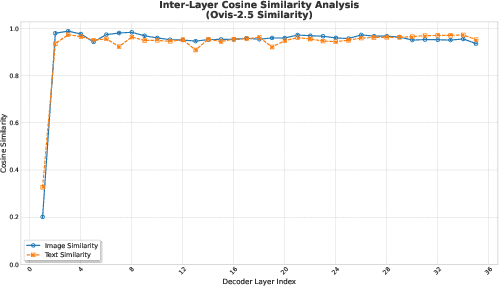
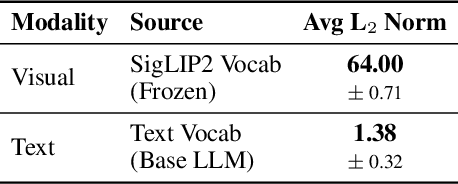
Abstract:Multimodal Large Language Models (MLLMs), which couple pre-trained vision encoders and language models, have shown remarkable capabilities. However, their reliance on the ubiquitous Pre-Norm architecture introduces a subtle yet critical flaw: a severe norm disparity between the high-norm visual tokens and the low-norm text tokens. In this work, we present a formal theoretical analysis demonstrating that this imbalance is not a static issue. Instead, it induces an ``asymmetric update dynamic,'' where high-norm visual tokens exhibit a ``representational inertia,'' causing them to transform semantically much slower than their textual counterparts. This fundamentally impairs effective cross-modal feature fusion. Our empirical validation across a range of mainstream MLLMs confirms that this theoretical dynamic -- the persistence of norm disparity and the resulting asymmetric update rates -- is a prevalent phenomenon. Based on this insight, we propose a remarkably simple yet effective solution: inserting a single, carefully initialized LayerNorm layer after the visual projector to enforce norm alignment. Experiments conducted on the LLaVA-1.5 architecture show that this intervention yields significant performance gains not only on a wide suite of multimodal benchmarks but also, notably, on text-only evaluations such as MMLU, suggesting that resolving the architectural imbalance leads to a more holistically capable model.
PR-CapsNet: Pseudo-Riemannian Capsule Network with Adaptive Curvature Routing for Graph Learning
Dec 09, 2025Abstract:Capsule Networks (CapsNets) show exceptional graph representation capacity via dynamic routing and vectorized hierarchical representations, but they model the complex geometries of real\-world graphs poorly by fixed\-curvature space due to the inherent geodesical disconnectedness issues, leading to suboptimal performance. Recent works find that non\-Euclidean pseudo\-Riemannian manifolds provide specific inductive biases for embedding graph data, but how to leverage them to improve CapsNets is still underexplored. Here, we extend the Euclidean capsule routing into geodesically disconnected pseudo\-Riemannian manifolds and derive a Pseudo\-Riemannian Capsule Network (PR\-CapsNet), which models data in pseudo\-Riemannian manifolds of adaptive curvature, for graph representation learning. Specifically, PR\-CapsNet enhances the CapsNet with Adaptive Pseudo\-Riemannian Tangent Space Routing by utilizing pseudo\-Riemannian geometry. Unlike single\-curvature or subspace\-partitioning methods, PR\-CapsNet concurrently models hierarchical and cluster or cyclic graph structures via its versatile pseudo\-Riemannian metric. It first deploys Pseudo\-Riemannian Tangent Space Routing to decompose capsule states into spherical\-temporal and Euclidean\-spatial subspaces with diffeomorphic transformations. Then, an Adaptive Curvature Routing is developed to adaptively fuse features from different curvature spaces for complex graphs via a learnable curvature tensor with geometric attention from local manifold properties. Finally, a geometric properties\-preserved Pseudo\-Riemannian Capsule Classifier is developed to project capsule embeddings to tangent spaces and use curvature\-weighted softmax for classification. Extensive experiments on node and graph classification benchmarks show PR\-CapsNet outperforms SOTA models, validating PR\-CapsNet's strong representation power for complex graph structures.
 Add to Chrome
Add to Chrome Add to Firefox
Add to Firefox Add to Edge
Add to Edge